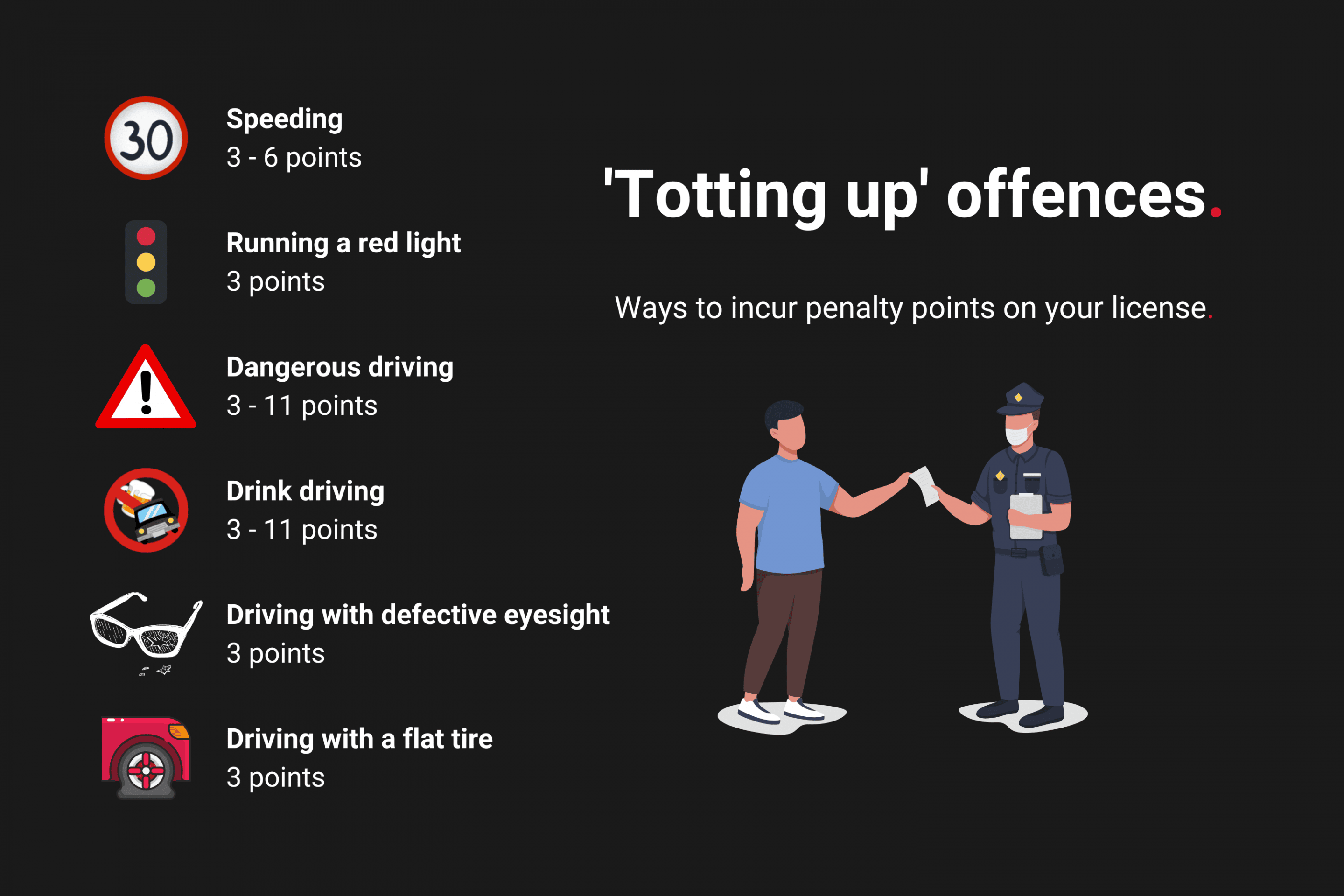‘Totting up’ relates to the accruement of penalty points on your driving licence. Most motoring offences carry a punishment of penalty points. Authorities will add these points to your licence on conviction. Acquiring 12 penalty points or more in three years or less in all but limited circumstances will result in disqualification from driving.
In this article, we outline exactly what a ‘totting up’ ban is and answer the most important questions you may have on the matter.
What are penalty points?
If you’re convicted of a motoring offence, the courts may endorse your driving licence with penalty points. Only points obtained within the 3 years count towards ‘totting up’ calculations. However, these endorsements can remain on your record for 4 – 11 years (which will affect your insurance), depending on the seriousness of the offence.
Some common examples of endorsements include:
- Driving without due care and attention – 3 to 9 points
- Exceeding the speed limit – 3 to 6 points
- Failure to comply with traffic light signals – 3 points
Visit GOV.uk to view your driving record and check your penalty points and disqualifications.

What is a ‘totting up’ ban?
A ‘totting up’ ban is a driving ban that comes as a result of accumulating 12 or more penalty points on your licence within 3 years. The court will arrange a hearing where they will decide, based on the severity of the offences, the length of the disqualification.
A ’totting up’ ban will last for a minimum of 6 months. After this, you can reapply for your driving licence and begin driving again. However, if you have previously had a driving ban for longer than 56 days within the past 3 years, the disqualification is likely to be:
- 12 months for one previous disqualification
- 2 years for two or more previous disqualifications.
Differences for new drivers.
 New drivers are drivers who have had their licences for 2 years or less. New drivers are only able to receive 6 points on their licences before receiving a ‘totting up’ ban. This means that, for example, two speeding offences (3 points each) within the first 2 years of passing your test will lead to having your licence revoked.
New drivers are drivers who have had their licences for 2 years or less. New drivers are only able to receive 6 points on their licences before receiving a ‘totting up’ ban. This means that, for example, two speeding offences (3 points each) within the first 2 years of passing your test will lead to having your licence revoked.
Having your licence revoked is different to disqualification in that the new driver must also resit both their theory and practical driving tests to regain their full licence. The points will also remain on their licences even after they have become a fully qualified driver.
Can you reduce or prevent a ‘totting up’ ban?
In short, yes. There are several routes you can take to avoid or lessen the impact of a ‘totting up’ ban. These include:
Successful defence against the motoring offence allegations in court.
It may seem obvious but like with all court cases, if you are not guilty of a driving offence you can take the matter to trial. If found not guilty, you will not receive any penalty points or disqualification.
Contact our expert criminal law team at Britton and Time Solicitors, and we will assist you in presenting your defence as strongly as possible in court.
Special reasons.
Special reasons relate to the circumstances of the offence committed. Special reasons cannot amount to a defence to the offence but are relevant to the circumstances surrounding the offence and therefore the court ought to rightly take them into account.
 Circumstances relating to the offender themselves like the impact of disqualification or the offender’s lack of previous convictions cannot amount to a special reason. Common special reasons are being involuntarily intoxicated, a medical emergency, or driving a very short distance.
Circumstances relating to the offender themselves like the impact of disqualification or the offender’s lack of previous convictions cannot amount to a special reason. Common special reasons are being involuntarily intoxicated, a medical emergency, or driving a very short distance.
For example, you have a passenger in desperate need of medical attention, meaning that you must drive faster than the speed limit to get them help in time. When facing a charge of driving in excess of the speed limit, the related penalty points or disqualification could be avoidable due to the medical emergency.
It is very difficult to present a successful special reasons argument in court. To be successful, it is almost always necessary to have professional and experienced representation.
An exceptional hardship argument.
An exceptional hardship argument is the process of persuading the court that a driving ban would result in disproportionate consequences.
A ‘totting up’ ban should cause some hardship as this is the purpose of a driving ban. However, if you believe that the hardship due to disqualification would be above and beyond that usually suffered, you may be able to argue exceptional hardship.
You can argue exceptional hardship when facing a ‘totting up’ ban, so long as you haven’t argued exceptional hardship on the same grounds in the last 3 years. The court is far more likely to accept that your disqualification will cause exceptional hardship if innocent parties such as your family, elderly relatives or young children would suffer hardship from your disqualification.
An exceptional hardship argument should present all factors, so the court understands the full picture, including the impact on you.
Can you delay a case to prevent a ‘totting up’ ban?
We recently received this question from a client: “If I have 9 points on my licence and 3 are set to expire in the next few days, can I delay my hearing until after they’ve expired to avoid a totting up ban?”
Contrary to what you may believe, in this situation, the court will always look at the number of points that were live on your licence at the time of your most recent offence. This means that it is not possible to delay a case to avoid a driving ban.
What happens after a ‘totting up’ driving ban?
Once you receive the ban, you will be unable to drive from that day onwards. You are then unable to drive for the duration of the ban.
However, once the disqualification is over, you will not have to resit your driving test, provided that your test took place over 2 years prior. The court will remove all points from your licence on disqualification and you will be able to continue driving with a clean licence again.











Comments
Hi I’m 41 years old but have been continuously banned never beeing able to apply i recieved various bans as long as ten years at one point but haven’t drove for more than ten years my last ban was 4 or six years but I was off the understanding they ran concurrent so I knew that the 10year ban was up counting starting it again with the 6year ban as concurrent meant starting the 6 year ban or finishing the 10 year ban which ever was longer as it was concurrent I have a copy of my previous conviction my ban should be up my license was endoresed so I applied last year they sent me a Cheque back saying I was banned for life I have never been banned for life I’ve never been convicted of drink or drug charges or speeding I was convicted of death by dangerous driving as my window had ice on it? Which was described as a accident for everyone I was convicted of disqualified driving a few times but a think they are confusing the enorsed with banned for life a want to drive legally but don’t know what else a can do seen three lawyers who where criminal lawyers and didn’t seem intrested in going through appeals a think a need a specialist lawyer ma ten year ban was 2004 and offence was 2002 also 7years in 2005 and last was 4years. 2013 can I ever get my license back surely they are spent 2013 was 10years ago no bans where ever consecutive as far as I am aware can you help me?
Leave a comment Your email address will not be published.